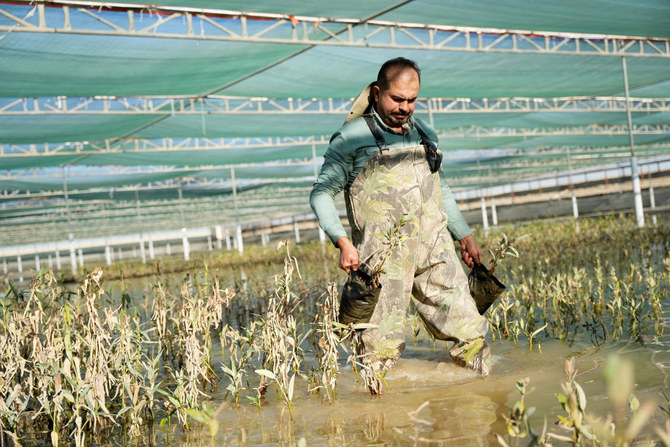BASRA: As Aymen Al-Rubaye plants mangrove seedlings in the sprawling tidal flats of southern Iraq, the black smoke rising over the skyline behind him shows the ecological damage that he is toiling to undo.
Rubaye, an agricultural engineer, is working for a project started by Iraqi government bodies and a United Nations agency to grow up to 4 million mangrove trees in the Khor Al-Zubair mudflats region, located near major oil fields.
Ankle-deep mud sucks at his boots as he pats down a seedling and moves on to plant another, part of what he hopes will become a mangrove forest that protects the coast, shelters vulnerable species and battles climate change.

“This plant will save us time and effort in our fight against global warming,” he said, describing the plant’s ability to capture and store carbon dioxide.
Iraq’s carbon emissions have more than doubled over the past decade, according to the World Bank, making it one of the region’s worst polluters when measured against the size of its economy.
The tidal flats south of Basra are a baking landscape of water, salt, mud and hazy sky, riven by channels that Rubaye and his team navigate by boat.
The smoke in the distance is billowing from a petrochemical plant near Zubair oil field, some 20 kilometers (13 miles) away, part of a vast energy sector that provides the bulk of Iraq’s income and is the main industry — and polluter — in the Basra area.

Southern Iraq was once known for rich marshes that were drained decades ago in an environmental catastrophe that wrecked a complex eco-system and pushed many of its inhabitants to ruin.
Planting mangroves on the tidal flats, south of where the marshes once lay, can protect coastal communities from storms and floods and create a new home for threatened species without using any of Iraq’s scarce freshwater for irrigation.
The scheme was inspired by successful projects to rehabilitate mangrove forests in nearby Kuwait and in the United Arab Emirates at the other end of the Gulf.
Mangrove plants “can resist these harsh conditions we are passing through” without needing irrigation water, Rubaye said. Mangroves thrive in the sort of hot, muddy and salty conditions that most other plants find inhospitable.
The new trees come from a nursery where 12,000 seedlings were growing, said Ahmed Albaaj of the UN’s World Food Programme, which worked on the project with Basra’s local government and university, and Iraq’s environment ministry.

























